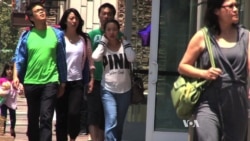The city of Los Angeles, California, has one of the largest multi-ethnic group of millennials - those between 18 and 34 - in the United States, and more than half of them speak more than one language. Bilingualism may be common in some countries, but it is a new phenomenon in the United States.
Maria Elena Burgos, cooking a Mexican breakfast, says that this is just one of the many traditions in her home. Another one is making sure her children speak Spanish.
“We want them to be bilingual. We want them to keep the Spanish somewhere in their learning too, not only at home,” said Burgos.
When Burgos immigrated to the United States from Mexico, she learned English. She knew English would come easily for her five American-born children, so she wanted them to speak Spanish at home and learn it at school. She says it will give them more opportunities in the future and allows them to communicate with their relatives in Mexico and El Salvador.
“When we had our children, one of the decisions we as parents decided was to name them with a name that was easily pronounced in English and Spanish because we have family in Mexico and in El Salvador,” Burgos said.
Her children, including daughters Elizabeth and Monica, appreciate the fact that they speak English and Spanish.
"The culture -- to go back to our roots because that’s part of who we are,” said Elizabeth.
“It’s nice to know our culture and then to be able to pass it onto our children and grandchildren and everyone to let them know where we come from,” Monica added.
‘Sea change’
The U.S. Census Bureau says more than half the adults in the Los Angeles area between 18 and 34 years old speak a language other than English at home - compared to 25 percent nationwide. While the number of bilingual speakers has increased when compared to the 1990s, the number of foreign-born millennials in L.A. has decreased. Many immigrant parents are passing their native language on to their American-born children, says University of California Los Angeles professor Raul Hinojosa.
“I’ve definitely seen a sea change in the last ten years,” he said.
Hinojosa says historically, the children and grandchildren of immigrants would stop speaking the parents’ native language. But now the opposite is true. The next generation is encouraged to maintain the language of their immigrant parents.
“That was unexpected historically and I think it’s going to have a huge impact both obviously in terms of the Latino population going forward but probably other generations, other demographies that are now also making the choice not to eliminate the original language but follow the same path of pride," Hinojosa said. "Mandarin is going to be encouraged. Japanese is going to be encouraged. Vietnamese is going to be encouraged.”
Los Angeles may be seeing this change now, but Hinojosa says as the number of minorities continue to grow in the U.S., bilingualism will spread to the rest of the country.
“There’s a real fundamental ethno-racial transformation which is now permanent and will continue in the United States and it is inevitable that by the end of the century the entire country will now be definitely majority not-white in origin,” he said.
Hinojosa predicts this trend will spur a growing interest in learning multiple languages. Meanwhile, Monica Burgos says in addition to English and Spanish, she has even learned some Korean in school.





